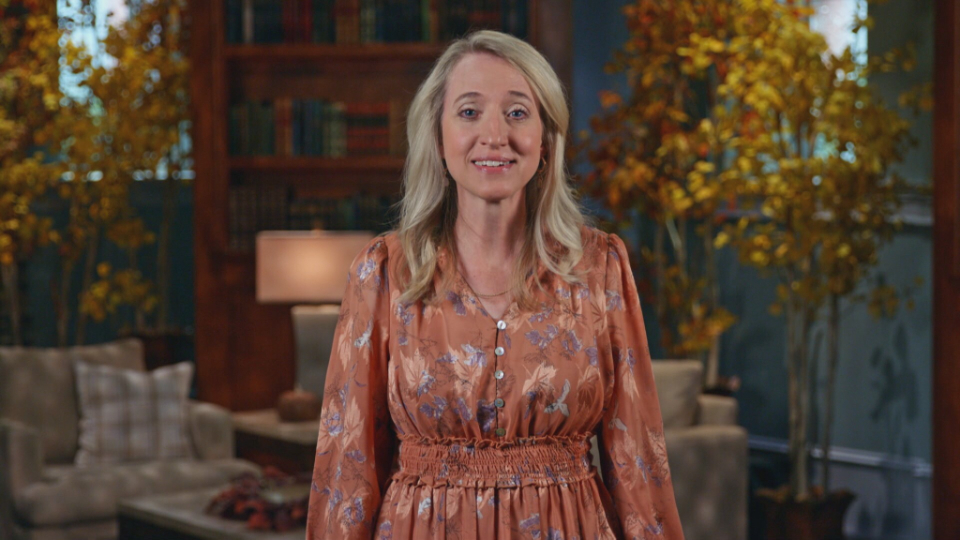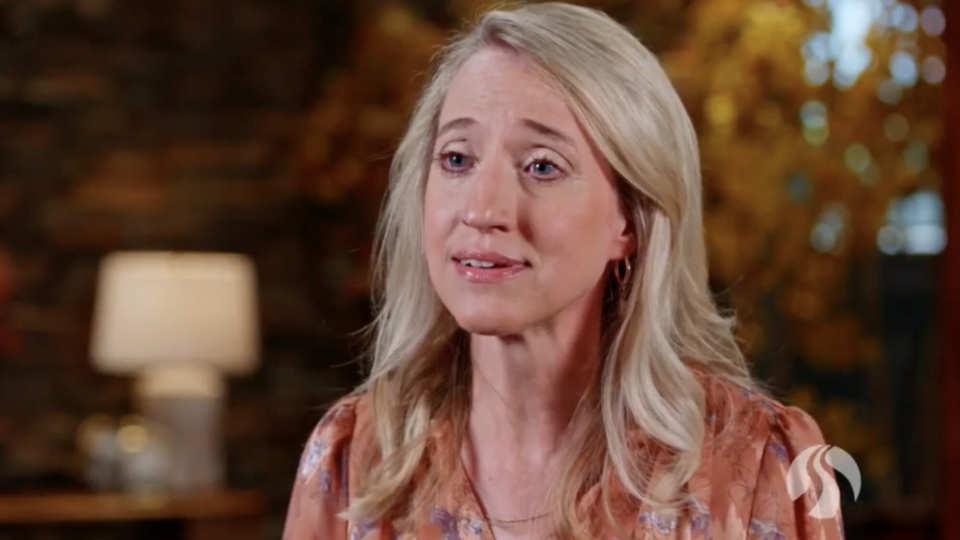
BYU-pathway
Jenet Jacob Erickson, BYU associate professor of religious education, speaks during a devotional broadcast to BYU–Pathway Worldwide students on Tuesday, November 7, 2023. Screenshot from byupathway.org, courtesy of Church News.All rights reserved.This story appears here courtesy of TheChurchNews.com. It is not for use by other media.
By Rachel Sterzer Gibson, Church News
All will experience some deep, unfulfilled yearnings in family life, noted Jenet Jacob Erickson, associate professor of religious education at Brigham Young University.
Some will not have the blessing of a loving marriage for a host of possible reasons, Erickson said, whether it is a lack of viable prospects, same-sex attraction, physical or mental impairments, fear of failure that overshadows faith, or having a marriage that ended. Others will feel the deep pain of not being able to bear children.
However, “it is in the midst of this seeming opposition that the divine plan for our learning, growth, and redemption is powerfully revealed,” Erickson said during a devotional broadcast to BYU–Pathway Worldwide students on Tuesday, November 7
In her remarks titled “The Grand Story of Our Eternal Family,” Erickson explained that the plan of salvation is really a story of a remarkable family.
“You are my brothers and sisters,” Erickson told students. “The divine nature of our heavenly parents is carried in the composition of our spiritual bodies. Through them, we have been given the capabilities, powers, and faculties They possess, though in an undeveloped state.”
The culmination of the Creation was the creation of man and woman. In the Garden of Eden, “Eve and Adam made a decision they knew would bring death into the world, but it would also bring life — family life. They would be blessed with children. That family would provide the essential setting for our physical birth and the opportunity for growth and development in the process of spiritual rebirth,” Erickson said.
“The Family: A Proclamation to the World” assures all that they belong in a family of perfect heavenly parents who are “divine love itself” when it states, “All human beings — male and female — are created in the image of God. Each is a beloved spirit son or daughter of heavenly parents, and, as such, each has a divine nature and destiny.”
As a social scientist, Erickson said she has witnessed the importance of stable, loving marriages. “No other structure on earth more effectively makes possible that parents will provide the secure and stable environment of nurturing caregiving that children depend on,” Erickson said.
Mothers are primed to establish a bond through which the emotional communication that is essential for development can occur. “This relationship appears to shape the foundations of identity, sense of wellbeing, and emotional understanding,” she explained.
In a complementary way, a father’s closeness to his children shapes their relational capacity, achievement, understanding of boundaries and emotion management, Erickson continued. “A father’s closeness offers daughters a deep experience of what protective male love feels like, strengthening her capacity for wise sexual decisions. His closeness to his sons offers an experience with masculinity that is protective and nurturing, not driven by aggression or sexual proclivities.”
The reality of this divine pattern — of a married mother and father — in a child’s development explains why the sacred powers of procreation are reserved for marriage. “Sexual union is designed to create and symbolize a union strong enough that a child’s heart can rely upon it,” she explained.
Its fragmentation can cause suffering to men, women and children. Erickson recalled how her husband’s parents divorced when he was 6 years old. “He grew up without religious faith but had deep feelings for Christmas because, on that day, his parents would come back together for a few hours, and he would feel a wholeness again.”
While there are painful realities in mortality regarding family life, “our Eternal Father covenanted to send His Beloved Son to be our Savior and Redeemer. Jesus Christ is the being who brings ‘at-one-ment’ to our souls and to all of our relationships,” Erickson testified. “He is the Master Healer, the Repairer of the Breach, the Restorer. He yearns to bless us with His love and pour out His healing grace in covenant relationship with Him.”

BYU-pathway
Jenet Jacob Erickson, BYU associate professor of religious education, speaks during a devotional broadcast to BYU–Pathway Worldwide students on Tuesday, November 7, 2023. Screenshot from byupathway.org, courtesy of Church News.All rights reserved.Some fear their pain and loss in being single, never married, divorced, infertile, struggling in marriage, suffering abuse, wrestling with questions of gender or sexuality — or any other seeming difference from the ideal — marks them as less worthy or that they do not belong, Erickson said. Instead, Christ says, “I am the Lord thy God, the Holy One of Israel, thy Saviour. ... [Thou] wast precious in my sight ... and I have loved thee. ... Fear not: for I am with thee” (Isaiah 43:3-5).
As a single woman for many years, Erickson said turning to her Redeemer helped her find peace and direction. When she finally married, she needed to be anchored in Jesus Christ as she face infertility. After she was blessed with two children, she felt her many weaknesses in mothering.
“As I struggled it became clear to me that I was denying the reality of my Redeemer. Yes, this is the great plan of family — the Creation provided the place for the family to live. The Fall provided the place for the family to grow. But it is the Atonement of Jesus Christ that makes possible the fullness of grace that is needed for the family to become healed and eternally one,” Erickson explained.
Through covenant relationship with God, Christ’s sanctifying power “enters us, giving us power to do what is needed to bless our families, opening the way for us to be ever closer to Him and ever closer to others. Miraculously, through His grace and redemption — and His alone — we can become the kind of people in the kinds of relationships that define heaven.”
Erickson noted that many BYU–Pathway students are motivated by a desire to bless their families, sometimes in the midst of profound difficulty. “Our Redeemer walks beside you in all of it,” Erickson assured. “He is ‘the way, the truth, and the life’ (John 14:6). His great purpose is to enable us to become beings of eternal love, in the deepest form of relationship.”